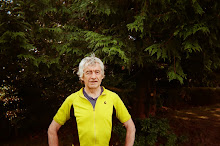I began cycling - commuting, shopping, touring, recreation, a bit of racing - about 55 years ago in the UK. It amazes me that apparently sane, intelligent, well-informed, able-bodied, reasonably healthy people continue to prefer using expensive, polluting, difficult to park private automobiles, and sitting in traffic jams to getting around on a bicycle. The psychology underlying the hostility of many motorists and police to cyclists still arouses my curiosity. Furthermore, I remain puzzled by the fact that thousands will enter for a 10k run (or even marathon) yet you are lucky to get 40 for a bike race.
I submit these matters are connected. If cycle racing were an accepted part of school athletics cyclists in general would receive more respect. Cyclists are perceived correctly as a threat to the dominant car-cult, affluent, consumerist lifestyle, and the mindset that economic growth and jobs rather than social and individual well-being are the main political goals. However, if cycle racing were an accepted school sport it would be more difficult to dismiss cyclists as anti-social cranks/weirdos, or loutish scoff-laws. It would be more difficult to frame racing cyclists as drug addict fanatics.
To some extent cyclists have become the 'other' whom it is still acceptable to objectify, discriminate against, belittle, mock, marginalise, disempower, even hate (partly replacing homosexuals, atheists, women, ethnic 'minorities', the disabled, the lower classes as targets of/scapegoats for pent-up inner self-dissatisfaction and feelings of inadequacy giving rise to rage reinforced by false sense of entitlement and cult of victimhood). Cyclists embody for many in affluent society, in ways in which running (soccer, tennis, skiing, etc.) do not, an alternate lifestyle which questions values about which people already feel uneasy but are not yet ready to examine and modify. Cyclists take the challenge to car cult affluence/consumerism to the streets, malls, and parking lots.
I believe the conflict between West Shore Parks and Recreation and the Greater Victoria Velodrome Association for instance - over demolition of, or access to, the Juan de Fuca Velodrome in part has this underlying psychodynamic. Cycling represents low income, poverty (can't afford a car), low status, and hence is something to be feared and shunned. In addition cyclists arouse resentment. They are perceived as people who think they are superior : more educated, enlightened, liberated, healthier, greener, more independent/self-sufficient. It could be socially beneficial to present cycling and cycle racing in a different way : as something trendy/cool associated with open critical thinking, emotional awareness, and a vigorous healthy counterculture.
As a member of Greater Victoria Cycling Coalition, and BC Cycling Coalition as well as Vancouver Island Coordinator for BC Masters/Seniors Cycling Association I am committed to finding safe, fun forms of cycle racing which are attractive to average athletes (any age, female or male) looking for fitness, exhilaration, fellowship who are constrained by other interests and commitments. Also, I have founded an unusual cycling club which combines interest in cycling and cycle racing with interest in philosophy, social issues, and mental health. A cyclosophy or velosophy club you might say. One reason why I advocate cycle racing is that I have found it to be a useful aid (superior in some ways to running, swimming, or cross-country skiing) in better management of tendencies to anxiety and depression. Check out www.velociraptors.ca and bcmasterscycling.net . Apologies for my beginner's computer and internet clumsiness. Safe cycling! May 15 2009
Subscribe to:
Post Comments (Atom)

When people are caged in automobiles, they cannot engage other drivers socially in close contact, and that is why people's stress levels rise when in these motorized wheelchairs.
ReplyDeleteHere we are waiting for the technological advances, i.e. electric cars, that might save the planet, but under our noses for over a century has been the bicycle: a low-tech solution to our social and environmental woes.